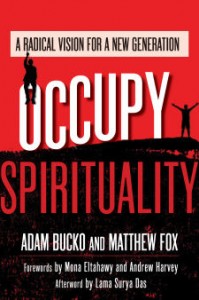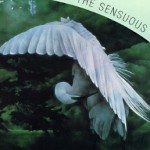 Occupy Spirituality: A Radical Vision for a New Generation
Occupy Spirituality: A Radical Vision for a New Generation
Adam Bucko and Matthew Fox
North Atlantic Books, 2013
Matthew Fox and Adam Bucko make me feel old.
That’s kind of funny, considering both are older than me (Fox by decades). Perhaps it’s more accurate to say that this book put me in mind of a younger version of myself, one who burned white-hot to make the world a better place and was willing to bend the course of her entire life to that end.
It’s not that I no longer have an activist heart. I do. But it surprised me to be technically part of the youth generation addressed by this book—a generation of young people viscerally angry at the failures of consumer capitalism and organized religion, whom Bucko and Fox see as standing ready to take up their true vocations, form communities of alternative values, and enact (on a small scale, at least at first) a new vision of spiritual democracy. I’m 34 and a mother-to-be; this book speaks to me as I was ten years ago, when I worried less about paying my bills and life seemed to hold infinite possibilities.
This isn’t my first encounter with Matthew Fox, an earth-centered Christian theologian who, on account of his radical activist theology, was once silenced for fourteen months by the Pope and ultimately ejected from the Dominican order. In my early twenties, I attended a Creation Spirituality-centered, GLBT-welcoming Methodist church that did its best to act on Fox’s vision of a prophetic activism founded in mysticism and creativity. I still have amazing memories of attending one of Fox’s Cosmic Masses, where we prayed at gorgeous three-dimensional elemental altars, passed the peace to hundreds of others while moving in a spiral, listened to Fox give a truly trippy homily about light, and finally danced like angels and demons to trance music under laser lights.
I later found my way into the Reclaiming tradition of witchcraft, which similarly believes that sustainable, healthy activism requires a steady diet of joy to maintain. (Fox, in fact, has worked extensively with Reclaiming co-founder Starhawk, and he mentions her admiringly more than once in this book.) During that period of my life, I did extensive activism opposing the racism of the drug war, protested the war in Iraq, marched in Gay Pride and MLK Day parades emphasizing civil liberties, wrote endless letters to my elected representatives, and chose a career (the academic study of religion) that I thought would give me maximum opportunity to promote tolerance, pluralism, equality, and peace.
Fast-forward as the restrictions of adult life set in. As it turns out, there are few academic jobs available these days, and what jobs remain are a shadow of the professorships of the past: low pay, intense competition, insanely heavy workloads, and schools that increasingly care more about the financial bottom line than education made me abandon my intention of working in academia proper. I also moved across the country for graduate school and lost the religious community that had been part of the support for my activist spirit. As it turns out, it is much harder to form one’s own group than to join a thriving one. For several years, my friends and I did our best to form a local Reclaiming community that would both feed our spiritual needs and provide a vehicle for political activism. And people did come to our rituals and workshops; they even donated money when we asked, but we never were able to grow the core group that was actually doing all the work. Between that and the intense stresses of grad school, I learned the true meaning of burnout.
After graduate school, I did a lot of re-evaluating and reshaped my life so that *I* would be fed first. I’d realized I couldn’t be of service to anyone else unless I was healthy, so I made a number of changes. I went to massage school, both to seek my own healing, and so that I would have a second career path to support myself (and indeed, massage therapy was my major source of income for several years). I sought deeper training and initiation in a non-Wiccan witchcraft tradition focused on self-development and acknowledged that, for the moment, I needed to pull back somewhat from the leadership roles I had tended to take on in religious community. Although I continued to volunteer my time with Cherry Hill Seminary, an online seminary dedicated to providing graduate-level and community education for Pagan leaders, I mostly stopped teaching spiritual workshops or leading public rituals. And, finally, I cut my expenses so I could choose only jobs that I both believed in and that compensated me appropriately. Over the past few years, I’ve worked for a series of humanitarian, religious, and educational organizations without much having to compromise my values.
At this point in my life, I’m not out hitting the street in protest. I give money to worthy organizations; I write the odd letter to my representative; I encourage the writers I work with at Patheos to highlight important issues and try to bring those issues to the attention of our audience. But fundamentally, my concerns now are about family, health, and home, about the container into which my husband and I are bringing a child. I think a great deal about poverty, racism, homelessness, and the web of power and privilege in which I find myself; I think a lot about how to have good relationships with my neighbors when I live somewhere that, most of the time, mine is the only white face to be seen. But these days, I am much more concerned with logistics than vision.
Someday, though, I’m going to be ready to dream and vision again, and Occupy Spirituality is a book that can stoke that inner fire. Based around Fox’s “deep ecumenism,” its approach is inherently interfaith, with Fox and Bucko frequently acknowledging the contributions of Buddhist, Hindu, Indigenous, Christian, and Jewish thinkers to their thought. Their vision of a just economy, notably, includes not just human well-being, but also what Fox calls the “more than human” – animals, plants, the ocean, the land. Fox and Bucko recommend a new spirituality for activist communities, inspired by contemplative monasticism but with contemporary values:
- Instead of a vow of poverty, a vow to create a just economy;
- Instead of a vow of obedience, a vow of democracy and collaboration;
- Instead of a vow of celibacy, a vow of sexual responsibility and ethical parenting.
As the subtitle acknowledges (“A Radical Vision for a New Generation”), this book is more about vision than about logistics. Appropriately for this post, however, long-time Pagan activist Starhawk can provide a nuts-and-bolts counterpoint to Fox and Bucko’s radical vision. Although Fox and Bucko have very much been in the trenches of social injustice (Bucko currently works with homeless youth in New York City, for example), their dialogue in this book tends to focus on broad issues. Not so Starhawk, who freely acknowledges that the radical inclusivity of the Occupy movement raised some difficult and specific challenges: in her speech at the American Academy of Religion in 2011, she quipped, “The Occupy movement sometimes seems to be entirely composed of raving drunks and former student body presidents” (listen around 28:00 in the linked audio; her discussion of group dynamics begins around 17:00).
While protesting for economic and social change, the Occupy movement encountered the challenges of mental illness, addiction, trauma, and the long-term effects of homelessness among its members and in society at large. Just prior to the birth of the Occupy movement, Starhawk put out a book called The Empowerment Manual that addresses some of the difficulties of collaborative group dynamics – and how-to manuals like it are equally as important as Bucko and Fox’s prophetic community vision when it comes to building a positive future.
I opened by saying that Occupy Spirituality made me feel old. But I know that there will be a future when my children are no longer small, and with my own needs and desires firmly in mind, I will expand my efforts to create communities of alternative values beyond my household and the circle of influence created by my job. For now, it’s been good to remember how brightly that inner fire can burn—and when I’m ready, Fox and Bucko’s vision will still be waiting.
Recommended Follow-Up Reading
“The Occupy Movement: Drumbeats of Change”
The encampments are now gone. But the things that were born in them survive.
By Rebecca Solnit, 9/15/13, LA Times
“Spirituality: Where Seriousness and Playfulness Meet”
How do how do the patterns and practices of the Occupy Generation differ from those of New Age spirituality?
By Matthew Fox, Christ Path Seminar
















